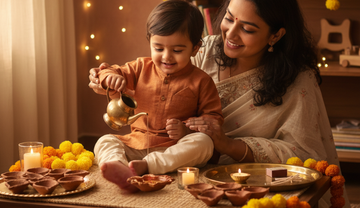Diwali is a celebration of light, joy, and renewal. But for a child, it is also a time when the world feels full of colors, sounds, and wonder. Montessori philosophy teaches us that every environment is a learning opportunity, even a festive one.
Instead of seeing Diwali as a disruption to routine, parents can use it as a season of meaningful learning. Through every diya, sweet, and song, a child can build life skills, confidence, and gratitude. These values last long after the lamps fade.
Here are 6 Montessori-inspired ways to make Diwali both festive and developmental for your child.
1. Give Them a Role in Preparing the Home
Children between one and six years old love practical life activities like sweeping, folding, wiping, or sorting. During Diwali cleaning, give your child a small cloth to dust their shelf or a basket to collect toys.

This builds responsibility, concentration, and pride in caring for their space. When they see a clean corner they helped prepare, they begin to understand that celebrations start with effort and care.
What your child learns: Order, independence, and mindfulness.
2. Let Them Explore the Senses of Diwali
The smell of diyas, the texture of rangoli powder, and the glow of lamps make Diwali a sensory wonderland. Instead of overstimulating children with loud lights or music, help them engage calmly.

Invite your child to touch, smell, and observe. Let them pour oil into diyas, press flowers for decoration, or feel the textures of clay and petals. Montessori sensory play teaches focus and awareness, and Diwali already provides these experiences naturally.
What your child learns: Observation, sensory refinement, and calm participation.
3. Involve Them in Making Decorations
Instead of buying ready-made décor, let your child make small, simple items like paper lanterns, natural garlands, or clay diyas. Give them real materials, not plastic, and a defined space to work.

This kind of festive art is more than craft time. It teaches process over product, the Montessori way of valuing creation more than perfection. When they see their diya glow alongside yours, the sense of pride and belonging is unmatched.
What your child learns: Creativity, focus, and emotional connection to work.
4. Celebrate with Intention, Not Overload
During Diwali, children are surrounded by noise, new faces, and long hours. This can be exciting, but also overwhelming. Keep the environment balanced with quiet rituals like lighting diyas, reading stories about light and kindness, or sitting together to watch the flickering lamps.

Studies show that children who experience calm, rhythmic celebrations build stronger emotional regulation. Montessori education mirrors this idea, reminding us that predictability and peace help children feel secure.
What your child learns: Emotional balance, mindfulness, and rhythm in routines.
5. Share the Joy Together
Diwali is a celebration of giving. Let your child help choose sweets to share with neighbours, wrap small gifts, or make handmade cards for helpers. These small acts build empathy, which is the heart of all Montessori learning.

When children participate in generosity, they learn that joy expands when it is shared. It helps them understand social connection, gratitude, and kindness in real ways, not just words.
What your child learns: Empathy, gratitude, and social awareness.
6. Create a Child-Sized Diya Corner
Set up one safe, low corner for your child to decorate as their own diya space. Add a few lamps, flowers, and maybe a small plant. Give them the freedom to arrange it daily during the festival.

This transforms Diwali from a once-a-year event into a week of mindful participation. For a child, repetition builds mastery and ownership. A dedicated corner also helps them focus and feel included in family traditions.
What your child learns: Focus, responsibility, and respect for rituals.
A Montessori Diwali: Where Light Meets Learning
Diwali celebrates light over darkness, and Montessori celebrates knowledge over imitation. When the two meet, festivals become powerful learning moments.

By giving your child a role, space, and responsibility, you are not just celebrating a festival. You are teaching life lessons to care, create, and connect. This Diwali, let your home glow with not just diyas, but with the quiet confidence of a child who feels seen, trusted, and capable.






